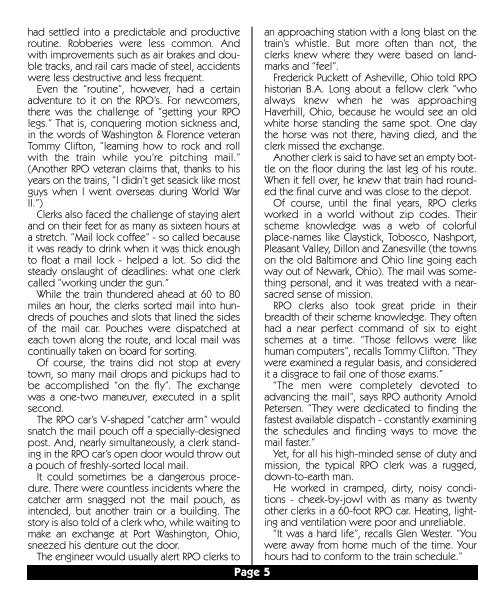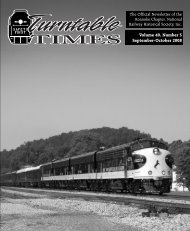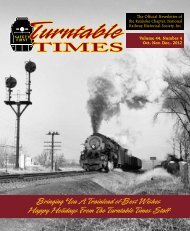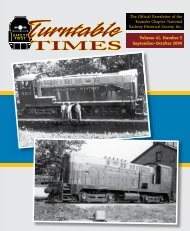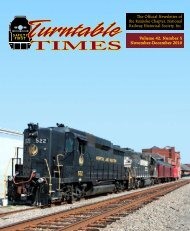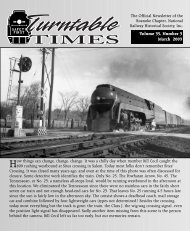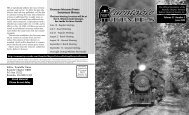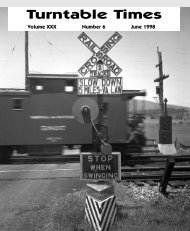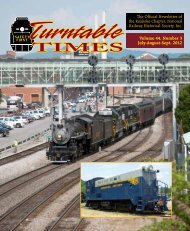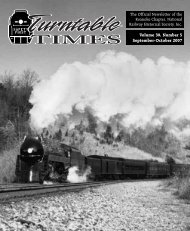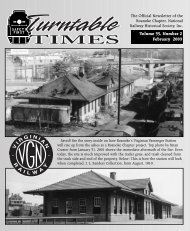February 1999 - Roanoke Chapter National Railway Historical Society
February 1999 - Roanoke Chapter National Railway Historical Society
February 1999 - Roanoke Chapter National Railway Historical Society
Create successful ePaper yourself
Turn your PDF publications into a flip-book with our unique Google optimized e-Paper software.
had settled into a predictable and productiveroutine. Robberies were less common. Andwith improvements such as air brakes and doubletracks, and rail cars made of steel, accidentswere less destructive and less frequent.Even the “routine”, however, had a certainadventure to it on the RPO’s. For newcomers,there was the challenge of “getting your RPOlegs.” That is, conquering motion sickness and,in the words of Washington & Florence veteranTommy Clifton, “learning how to rock and rollwith the train while you’re pitching mail.”(Another RPO veteran claims that, thanks to hisyears on the trains, “I didn’t get seasick like mostguys when I went overseas during World WarII.”)Clerks also faced the challenge of staying alertand on their feet for as many as sixteen hours ata stretch. “Mail lock coffee” - so called becauseit was ready to drink when it was thick enoughto float a mail lock - helped a lot. So did thesteady onslaught of deadlines: what one clerkcalled “working under the gun.”While the train thundered ahead at 60 to 80miles an hour, the clerks sorted mail into hundredsof pouches and slots that lined the sidesof the mail car. Pouches were dispatched ateach town along the route, and local mail wascontinually taken on board for sorting.Of course, the trains did not stop at everytown, so many mail drops and pickups had tobe accomplished “on the fly”. The exchangewas a one-two maneuver, executed in a splitsecond.The RPO car’s V-shaped “catcher arm” wouldsnatch the mail pouch off a specially-designedpost. And, nearly simultaneously, a clerk standingin the RPO car’s open door would throw outa pouch of freshly-sorted local mail.It could sometimes be a dangerous procedure.There were countless incidents where thecatcher arm snagged not the mail pouch, asintended, but another train or a building. Thestory is also told of a clerk who, while waiting tomake an exchange at Port Washington, Ohio,sneezed his denture out the door.The engineer would usually alert RPO clerks toPage 5an approaching station with a long blast on thetrain’s whistle. But more often than not, theclerks knew where they were based on landmarksand “feel”.Frederick Puckett of Asheville, Ohio told RPOhistorian B.A. Long about a fellow clerk “whoalways knew when he was approachingHaverhill, Ohio, because he would see an oldwhite horse standing the same spot. One daythe horse was not there, having died, and theclerk missed the exchange.Another clerk is said to have set an empty bottleon the floor during the last leg of his route.When it fell over, he knew that train had roundedthe final curve and was close to the depot.Of course, until the final years, RPO clerksworked in a world without zip codes. Theirscheme knowledge was a web of colorfulplace-names like Claystick, Tobosco, Nashport,Pleasant Valley, Dillon and Zanesville (the townson the old Baltimore and Ohio line going eachway out of Newark, Ohio). The mail was somethingpersonal, and it was treated with a nearsacredsense of mission.RPO clerks also took great pride in theirbreadth of their scheme knowledge. They oftenhad a near perfect command of six to eightschemes at a time. “Those fellows were likehuman computers”, recalls Tommy Clifton. “Theywere examined a regular basis, and consideredit a disgrace to fail one of those exams.”“The men were completely devoted toadvancing the mail”, says RPO authority ArnoldPetersen. “They were dedicated to finding thefastest available dispatch - constantly examiningthe schedules and finding ways to move themail faster.”Yet, for all his high-minded sense of duty andmission, the typical RPO clerk was a rugged,down-to-earth man.He worked in cramped, dirty, noisy conditions- cheek-by-jowl with as many as twentyother clerks in a 60-foot RPO car. Heating, lightingand ventilation were poor and unreliable.“It was a hard life”, recalls Glen Wester. “Youwere away from home much of the time. Yourhours had to conform to the train schedule.”


